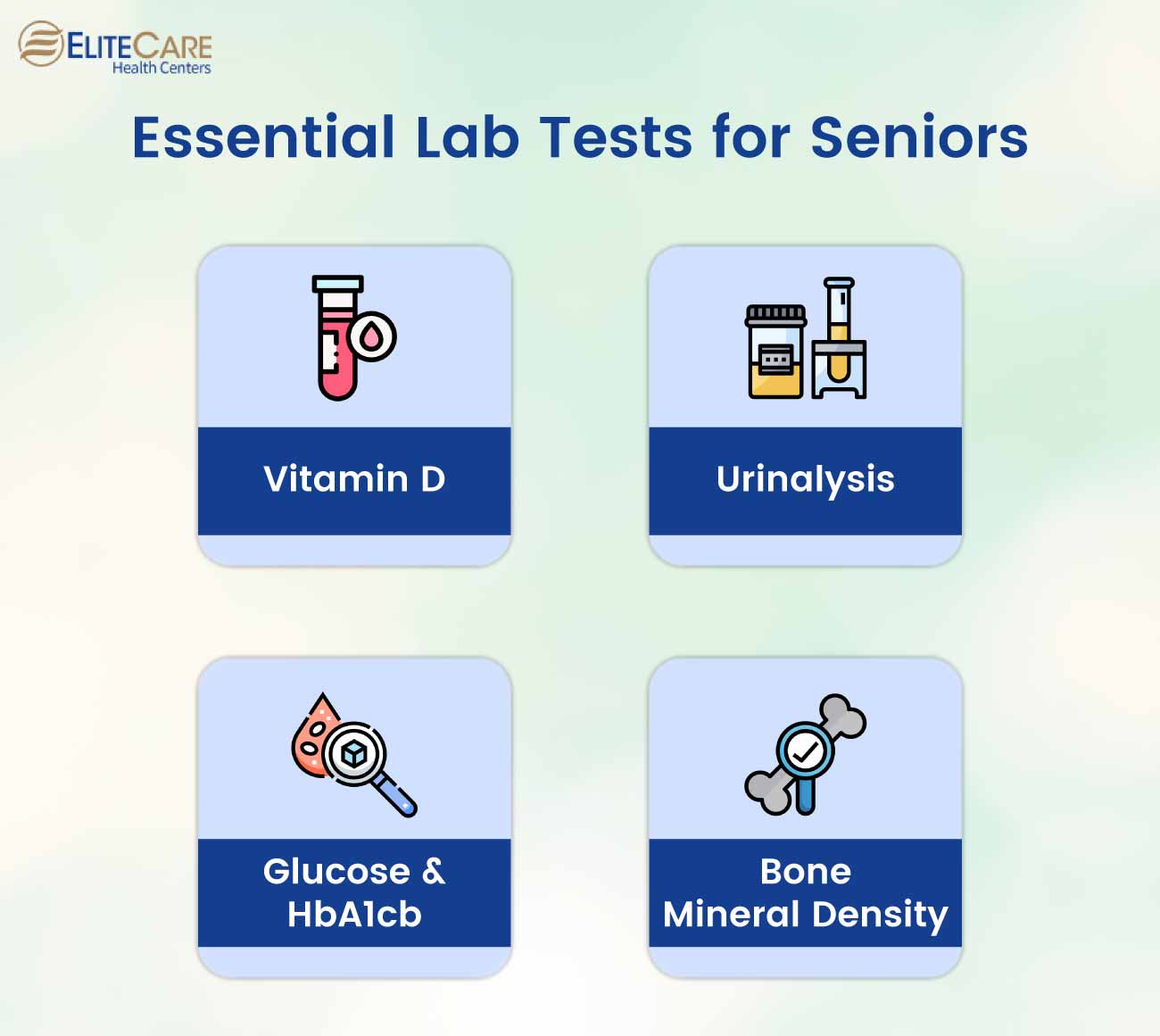
As we grow older, our bodies undergo a multitude of changes, making it crucial to pay closer attention to our overall health and well-being. Routine physical exam and medical check-ups play a vital role in proactively monitoring health parameters, and laboratory tests are a crucial part of this process.
Diagnostic tests at a lab involve the analysis of bodily samples, such as blood, urine, or tissue, to evaluate specific markers, substances, or organ functions. Lab tests results can help provide valuable insights into our body’s internal workings, identify abnormalities and enable early detection and prevention of potential health issues.
In this blog post, we will share detailed information about the importance of routine lab tests and the most important tests that should be conducted regularly in order to monitor seniors’ health. Read on to learn more.
Why are Lab Tests Important?
1. Early detection
Lab tests are a powerful tool to detect any diseases early on. They can help identify changes or abnormalities within the body, even before individuals experience any noticeable symptoms. With early detection, healthcare professionals can take prompt action, potentially preventing further complications or mitigating their impact.
2. Risk assessment
Some lab tests can help assess an individual’s risk for developing certain diseases or conditions. Identifying the potential risk factors can help healthcare providers curate customized preventive strategies and lifestyle modifications to reduce the risk.
For example, a lipid profile can help evaluate cholesterol levels, which can help assess the risk of cardiovascular disease. Similarly, the Fasting Plasma Glucose (FPG) test can help detect prediabetes, which can eventually lead to type 2 diabetes if not detected and treated in a timely manner.
3. Monitoring chronic conditions
Seniors suffering from chronic conditions like diabetes, kidney disease, or thyroid disorders should get regular lab tests done to monitor their status and further manage these diseases.
Lab tests and routine physical exams allow primary care physicians to track disease progression and help them adjust treatments as required.
4. Personalized healthcare
Lab tests can provide a deeper understanding of an individual’s unique health profile. Through these tests, primary care physicians can tailor personalized treatment plans to address individual needs.
Essential Lab Tests for Seniors

1. Complete Blood Count (CBC)
It is a common lab test that provides detailed information about the cellular components present in the blood. It measures various parameters, including the following:
- Red blood cells (RBCs): CBC helps determine the number of RBCs and assesses their size and hemoglobin content. Abnormalities in RBC count can indicate anemia or other blood disorders.
- White blood cells (WBCs): CBC not only provides the total WBC count but also assesses the count of different types of WBCs, such as neutrophils, lymphocytes, monocytes, eosinophils, and basophils. Any issue with WBC counts can indicate the possibility of allergies, infections, inflammation, or immune system disorders.
- Platelets: CBC also measures platelet count, a component responsible for blood clotting. If the results show that the platelet count is low, it can indicate bleeding disorders.
2. Complete Metabolic Profile (CMP)
Also known as the Comprehensive Metabolic Panel (CMP), the Complete Metabolic Profile is a set of tests that physicians recommend to evaluate organ functions and overall metabolic health. CMP can help assess the following components and bodily functions:
- CMP provides detailed information about electrolyte levels such as sodium, potassium, chloride, and bicarbonate.
- These tests also measure blood urea nitrogen (BUN), creatinine, and other markers to detect any kidney abnormalities.
- CMP includes a range of tests like liver enzymes (AST, ALT), bilirubin, and albumin to assess liver function.
- It includes the assessment of blood glucose levels to monitor blood sugar levels.
- These tests provide detailed information about total protein, albumin, and cholesterol levels.
3. Complete Thyroid Panel
It involves a set of tests to evaluate thyroid gland, which plays a vital role in metabolism and energy regulation. Thyroid panel tests can include checking TSH levels and other thyroid hormones.
Thyroid-stimulating hormone (TSH) test measures the level of TSH hormone, which helps control the production of thyroid hormones. If the test detects abnormal TSH levels, it can indicate hypothyroidism or hyperthyroidism.
4. Lipid panel
These tests are recommended to get information about cholesterol and triglyceride levels in the blood, helping in assessing cardiovascular health. The following are some common tests done under the lipid panel:
- Total cholesterol: It measures the overall cholesterol level in the blood.
- HDL cholesterol: The lipid panel also assesses high-density lipoprotein (HDL) levels, the “good” cholesterol that helps remove harmful cholesterol from the bloodstream.
- LDL cholesterol: This test measures low-density lipoprotein (LDL) levels, also known as the “bad” cholesterol. It helps evaluate the risk of plaque buildup in arteries.
- Triglycerides: It helps analyze the risk of heart disease.
5. Immunoglobulin levels
Our immune system produces immunoglobulins or antibodies- a type of protein that helps fight infections and diseases. Testing immunoglobulin levels helps detect the quantity of different types of antibodies in the blood.
This test involves the assessment of three main types of antibodies- IgA, IgG, and IgM. Abnormalities in test results can indicate immune system disorders, such as immunodeficiency or increased risk of autoimmune diseases.

6. Vitamin D level
Bone health undergoes significant changes with age as the bone remodeling process slows down. Therefore, it becomes crucial to monitor Vitamin D levels to ensure good bone health, immune function, and overall well-being.
Vitamin D levels are measured through a blood test called 25-hydroxyvitamin D. It reflects the concentration of vitamin D in the blood.
7. Urinalysis
This simple test helps examine urine to monitor kidney function, detect urinary tract infections, and identify kidney disorders. Urinalysis involves physical analysis such as checking for abnormalities in urine color, clarity, and presence of blood or sediment. It also measures chemical characteristics like pH levels to assess the concentration and acidity of urine.
8. Glucose and Hemoglobin A1c (HbA1c)
These two tests are often used for monitoring blood sugar levels and screening for diabetes.
- Glucose test: Two types of glucose tests can help measure the current blood sugar level. In the Fasting Plasma Glucose test, if the glucose level exceeds 126 mg/dL (milligrams per deciliter) or higher on two separate occasions, it indicates diabetes. Likewise, in the Oral Glucose Tolerance test, if the blood glucose level is 200 mg/dL or higher two hours after consuming the glucose solution, it confirms a diabetes diagnosis.
- HbA1c test: It assesses an individual’s average blood sugar levels over the past few months for a more comprehensive picture of long-term blood sugar control. Elevated HbA1c levels are indicative of poor diabetes management.
9. Bone Mineral Density (BMD)
This test provides valuable information about the density of minerals, such as calcium, in the bones. Dual-energy X-ray absorptiometry (DXA) technique is commonly used for measuring BMD.
BMD helps diagnose osteoporosis, assess fracture risk, and monitor bone health. Primary care physicians recommend regular BMD testing, particularly for women aged 65 and older and men aged 70 and older.
These are some of the most common lab tests that seniors should consider at regular intervals. However, the specific tests needed may vary for every individual depending on their health and medical history. Visit a healthcare center and consult with a primary care physician to get personalized guidance on specific lab tests and other routine exams necessary for maintaining optimal health.
Read More: Understanding the Difference between Kidney Stone & UTI
Understanding Lab Test Results
Negative or normal
It indicates that everything is within normal ranges, and the disease or substance being tested was not found in the sample.
Positive or abnormal
It means that the disease or substance being tested was detected in the sample, and physicians may recommend a further evaluation to confirm the diagnosis.
Inconclusive or uncertain
Sometimes, the lab test results may be inconclusive or uncertain, meaning that there isn’t enough information to make a definitive diagnosis or rule out a disease. In the case of inconclusive results, providers may prescribe additional tests to gather more information.
Conclusion
Lab tests play a vital role in understanding our overall well-being, detecting potential health issues, and enabling us to take timely action. In order to obtain the most accurate lab test results, seniors must understand how to prepare for lab tests and what to avoid beforehand. Preparation may involve fasting or avoiding medication or supplements which can interfere with the result of a test. Consult primary care physicians and follow their guidelines.
For any queries or concerns about routine physical exams, lab tests, or screenings, contact EliteCare Health Centers, a medical clinic, offering comprehensive senior care services.






